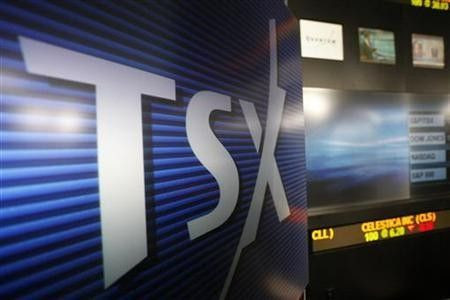Canada's Banks May Still Be Best TSX Bet for 2012

(Retuers) -- Canada's famously conservative banks, hit last week by a high profile downgrade, may still be the least bad option for Canadian investors in what could be another ugly year for stock markets.
The financial sector, whose shares outperformed the overall market in 2011, are unlikely to fall much, and yet have the potential to profit from any market recovery, analysts say.
"The place that is most right, right now, is in the financials sector," said Rick Hutcheon, president of RKH Investments. "That's where the game will be."
In 2011, the worst year for equity investors since the 2008 global meltdown, the overall market fell by 11 percent while financials were down 7 percent. Bank stocks were largely flat.
But the financial issues, which account for nearly 30 percent of the value of Toronto Stock Exchange's S&P/TSX composite index .GSPTSE, were in the spotlight last week when a well-known industry analyst downgraded the sector and predicted the three top lenders would see their shares decline in 2012.
Barclays Capital analyst John Aiken forecast an end to the double-digit profit growth that has powered the banks since the financial crisis.
Yet less-bearish observers said risks from Europe's debt crisis and other external threats make banks a wiser investment than more volatile energy and mining stocks. And traditional safe haven plays like telecoms and health care offer little upside after also outperforming the broader market in 2011.
BANKING ON BANKS
Instead of trying to mimic what worked in 2011, investors should look for companies in depressed sectors with good value, such as banks, said Barry Schwartz, a portfolio manager at Baskin Financial Services.
"(Pipeline operator) Enbridge (ENB.TO: Quote) is not going to grow at 20 percent a year," noted Schwartz. "However a bank stock could grow at 15 percent a year and they're trading at 10 times earnings."
Canadian banks also offer hefty dividends, and did not cut them in the recent recession. Five of Canada's six big lenders, including Royal Bank of Canada (RY.TO: Quote), Bank of Montreal (BMO.TO: Quote), Bank of Nova Scotia (BNS.TO: Quote) and CIBC (CM.TO: Quote) have dividend yields of more than 4 percent.
Market veterans said this offers some downside protection if global financial and economic turmoil worsens.
"It's a sign of confidence on the part of Canadian bank management that, regardless of the outlook, they felt that they were in sufficiently good shape to start raising dividends again," said Gavin Graham, president at Graham Investment Strategy.
Toronto stocks got off to a solid start in the first week of 2012, with the composite index rising almost 2 percent to close at 12,188.64. But gains are expected to be modest this year, with the index reaching just 12,500 by the end of 2012, according to a Reuters poll.
Many think problems outside of Canada, especially Europe's sovereign debt crisis, will impede global growth and demand for commodities. This would hurt more growth-sensitive sectors like mining and energy, which account for more than 40 percent of Toronto's composite index.
Last year, base metal and energy issues plunged 27 percent and 17 percent respectively, adding up to a miserable year for cyclicals after strong performances in 2009 and 2010.
Most of the gain from commodities in those years was driven by double-digit growth in China, the world's largest buyer of industrial metals. But Chinese growth slowed last year, igniting a downward spiral in base metal mining stocks.
Despite recent signs that the Chinese economy has steadied and the U.S. economy is picking up steam, euro zone debt worries are expected to dominate in early 2012.
Many also expect the gridlock in Congress to worsen as the U.S. presidential election approaches, hurting investor sentiment and compounding the difficulties for resource stocks.
Still, analysts said investors should not shun commodity-linked stocks indefinitely. Some think they could rally firmly in late 2012 if concern over Europe eases and the global economy gets back onto strong footing.
"To the extent that the market focuses on the U.S., more cyclical names, more consumer-oriented names and more pro-growth names make sense," said Stephen Wood, chief North American investment strategist at Russell Investments in New York.
"Getting overly defensive at very high valuations is not something people want to do."
© Copyright Thomson Reuters 2024. All rights reserved.




















